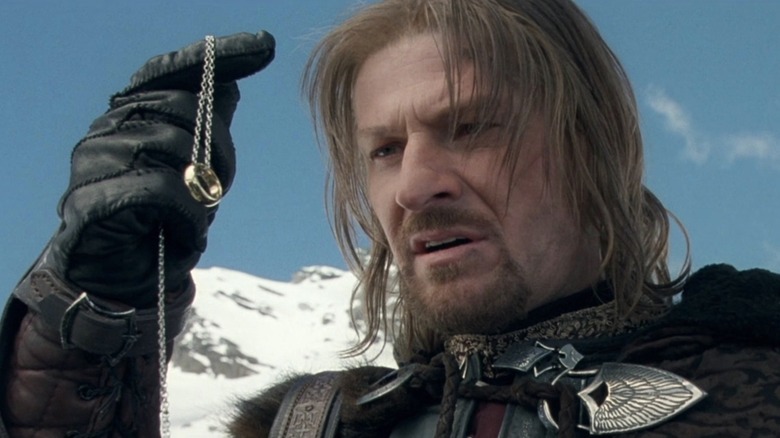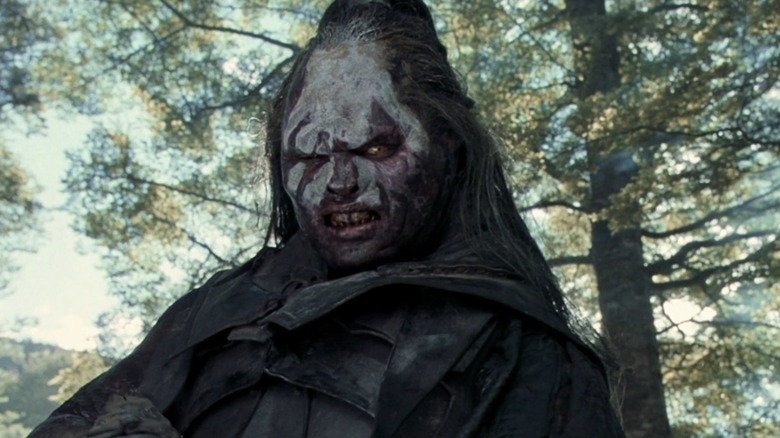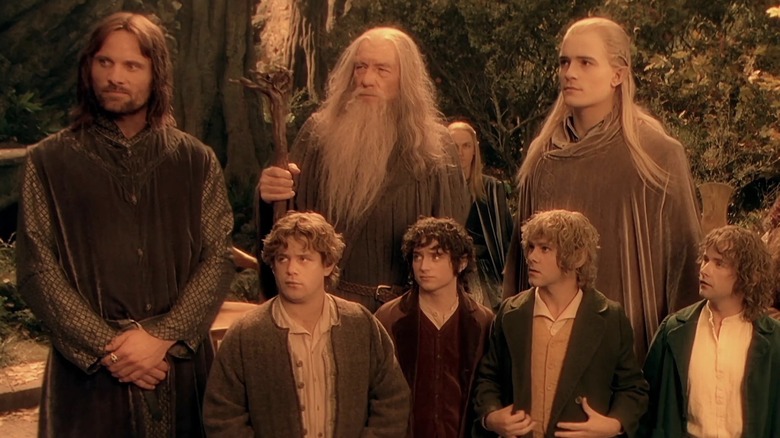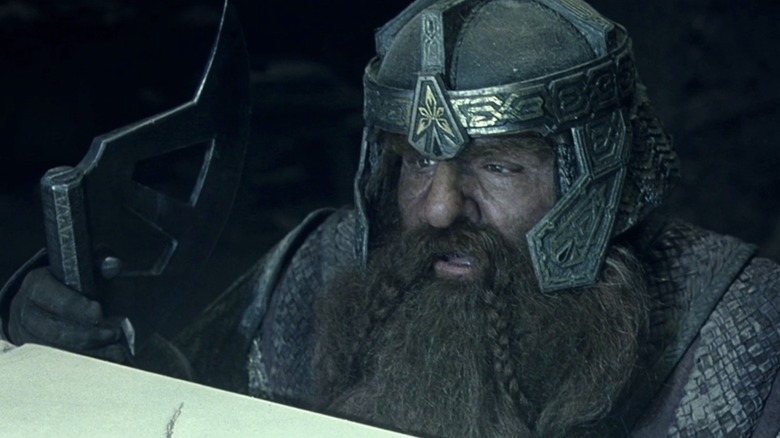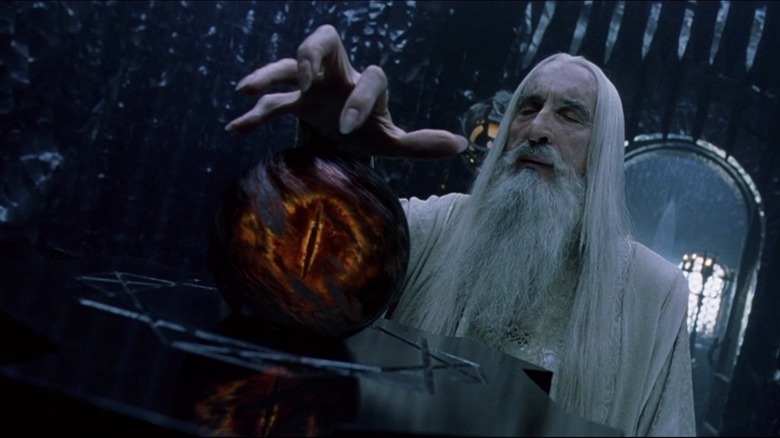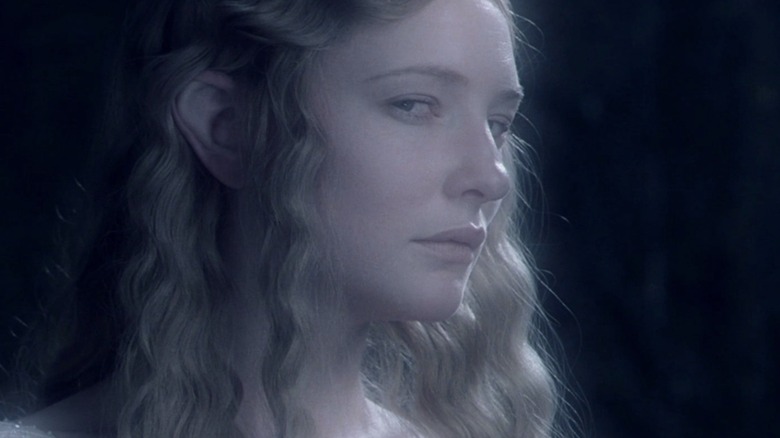The Daily Stream: The Lord Of The Rings: The Fellowship Of The Rings Is An Essential Rewatch After The Rings Of Power
(Welcome to The Daily Stream, an ongoing series in which the /Film team shares what they've been watching, why it's worth checking out, and where you can stream it.)
The Movie: "The Lord of the Rings: The Fellowship of the Ring"
Where You Can Stream It: Prime Video, HBO Max
The Pitch: Who's going through Middle-earth withdrawals? This is the first Friday in seven weeks where we haven't had a new episode of "The Lord of the Rings: The Rings of Power" to digest. If you're like me and have forged a renewed interest in J.R.R. Tolkien's works this fall, then you've probably already picked up a copy of "The Silmarillion" and/or started listening to the "Lord of the Rings" audiobooks, narrated by Andy Serkis.
Like many cinephiles-turned-bibliophiles, the first time I read "The Lord of the Rings" books was after seeing Peter Jackson's film adaptation of "The Fellowship of the Ring" way, way back in the Year of Our Lord 2001. In my day, kids, there was a thing called multiplexes; they had new-fangled "stadium seating," and we would have theatrical experiences in them. Alas, "much that once was is lost, for none now live who remember it."
I was late to the theater for my first viewing of "The Fellowship of the Ring" and wound up missing the whole prologue. When I got there, Gandalf (Ian McKellen) was already riding into the Shire on his horse-drawn cart, with Frodo Baggins (Elijah Wood) running out of the woods to meet him. Yet the prologue, in addition to setting up one of the greatest movie trilogies of all time, offers a crucial refresher on backstory and some connective tissue to this "Lord of the Rings" appendices adaptation we're now experiencing in "The Rings of Power."
Why it's essential viewing
Endlessly watchable and quotable, "The Fellowship of the Ring" is perhaps the purest expression of old-school movie magic that we've seen in any live-action Tolkien adaptation. The film builds to a thrilling climax, not with massive CG armies, but with a smaller band of stunt performers running through the hills in costumes. Forced perspective shrinks actors down to hobbit size while practical makeup effects bring to life the fighting Uruk-hai: elves "taken by the dark powers, tortured and mutilated, a ruined and terrible form of life ... and now perfected," under the treacherous wizard Saruman (Christopher Lee), whose tower in Isengard is a lair of sinister Dutch angles.
The Uruk-hai leader's first act upon being "born" is to kill. His big face-off (technically, arm- and head-off) with Strider/Aragorn (Viggo Mortensen), where he pulls the sword further into himself to get at the man holding it, is one of several moments that resolve story threads and help make "The Fellowship of the Ring" the single most self-contained "Lord of the Rings" movie.
The title says it all: this is the fellowship's tale. Members of the group trickle into the movie one, two, and three at a time, converging on the Council of Elrond in Rivendell, where we witness the fellowship come together with everyone in place at roughly the midpoint. Then, we see them embark on great adventures in the Mines of Moria and on a river where towering Argonath statues, pillars of kings, convey an unprecedented sense of scale.
At the end (21-year-old spoiler alert), the group is forced to break up, with the surviving characters going their separate ways. It allows this outwardly complicated mythos to play on the simple, recognizable human experience of people we come to know moving out of our lives.
The gang's all here
As much as I love the full "Lord of the Rings" trilogy — and Jackson's immediate follow-up to it, "King Kong" — there's a part of me that agrees with Mortensen about how the genie was out of the bottle, technology-wise, after this. "The Fellowship of the Ring" is the one movie in the series that was made without the benefit or crutch of a previous success behind it. The five films that came after it were all blockbuster sequels or prequels, riding the gravy train "The Fellowship of the Ring" set in motion.
And now we have the prequel to a prequel, "The Rings of Power." In the "Fellowship of the Ring" prologue, we see the forging of said rings. Galadriel (Cate Blanchett) explains in voiceover how "three were given to the elves ... seven to the dwarf-lords ... and nine, nine rings were gifted to the race of men."
"But they were all of them deceived."
I'll shoot you straight: beyond noting how it double-dipped the word "Rings," I never gave the title "The Lords of the Rings: The Rings of Power" much thought until the season 1 finale last week. Suffice it to say, viewers have now witnessed some of this deception and ring-forging firsthand. They know which rings have yet to be distributed and can guess where the story might go from there.
They've also gotten to know the younger versions of Sauron, Galadriel, Elrond, Isildur, and Elendil, so when you see them in "The Fellowship of the Ring" — together again for the first time — it has a class reunion feel. Elsewhere, there are references to things like the "Doors of Durin" and allusions to "the incident with the dragon" that now reward knowledge of both "The Rings of Power" and "The Hobbit."
Chastity, pipe-weed, and violence
Between "King Kong" and "The Lovely Bones," Jackson directed a short film called "Crossing the Line," and it does feel as though his filmography crossed some invisible line there, same as it did when he went from "The Frighteners" to "The Fellowship of the Ring."
"The Fellowship of the Ring" is really the movie where his own personal quest as a filmmaker stood upon "the edge of knife," like Galadriel says. This is your daily reminder that the One Ring corrupts all those who covet it, even Galadriel, whose gracefulness gives way to gaga eyes and stentorian pronouncements, such as, "All shall love me and despair!"
The morphing of Ian Holm's face as Bilbo when he makes an evil grab for the Ring on Frodo's neck is another little hiccup that could be seen as an early "shadow and a threat" of the unnecessary CG bloat that would spread across Jackson's later films, before he went away for a few years and came back reinvented as a war and music documentary filmmaker.
With firework displays for hobbit kids that make even a stern Proudfoot chuckle, there's an earnestness to "The Fellowship of the Ring" that is lacking in much of today's entertainment. That applies to the film's technical aspects, too, inasmuch as a sweeping epic like "The Lord of the Rings" could ever profess to having humble beginnings.
Even a show like "Ted Lasso" makes the "Lord of the Rings" franchise look chaste and wholesome by comparison. There are no f-bombs or one-night stands here, though of course, Jackson the onetime splatter filmmaker substitutes orc violence for sex, and he implies that Gandalf is a pipe-weed stoner, with Saruman noting, "Your love of the halflings' leaf has clearly slowed your mind."
'Evil is stirring in Mordor'
I've referred to it offhand in other recent articles, but "The Fellowship of the Ring" has a famous scene where the fellowship fights a fearsome cave troll. When that scene played in theaters, the world wide web was still relatively young, but I fully believe that the acceleration of internet culture — that lidless, Sauron-like, all-seeing online Eye, "wreathed in flame" at all times — has emboldened so many trolls to come out of their caves that no classic franchise film like "The Fellowship of the Ring" would be able to survive review-bombing if it were released for the first time now and subjected to the same unreasonable troll standards.
The race of men is failing. People would complain it was a betrayal of Tolkien, for instance, when Arwen (Liv Tyler) crosses the river with Frodo in "The Fellowship of the Ring," telling the Ringwraiths, "If you want him, come and claim him!" Apparently, some hardcore fans did complain about that scene back in the day because it's not in the books. There's even been speculation that this is why Arwen was cut from the Battle of Helm's Deep in "The Two Towers." Yet social media and the democratization and devaluation of film criticism via sloppy reviews and audience scores have only amplified complaints of that nature to where they now threaten to drown out enjoyment of anything.
In "The Fellowship of the Ring," Bilbo Baggins (Ian Holm) regales cute hobbit children with tales of trolls "all arguing amongst themselves about how they were going to cook us" before turning to stone. More broadly, in fantasy, trolls are known to guard bridges, quizzing those who would cross with inane questions, as we see with "the old man from scene 24" in "Monty Python and the Holy Grail."
One does not simply walk out ... or do they?
My point with all this troll talk is that it's better to build bridges than burn them or be a self-appointed gatekeeper who thinks they're Gandalf, blocking the Balrog with the battle cry, "You shall not pass!" For me and many others, movies like "The Fellowship of the Ring" — and yes, even streaming shows like "The Rings of Power" — can and have been a bridge to Tolkien.
That's not to say that the continuing saga of Middle-earth onscreen is or ever will be everyone's cup of tea. My wife used to live in the real Middle-earth, a lovely place called New Zealand, but she had never seen any of "The Lord of the Rings" movies until a few years ago when I tried showing her "The Fellowship of the Ring." We were watching it in English with Japanese subtitles, and the crash course in fantasy names was a bit much for her. She never got past the first movie, and I could only rub my forehead and think: one does not simply walk out of "The Lord of the Rings" after "The Fellowship of the Ring!"
That said, even I have my limits where I feel like Middle-earth's history becomes too dry and dense. "The Fellowship of the Ring" gets around that by offering a more complete arc for its characters than any other "Lord of the Rings" movie. It's an entry-level film that you could watch once or show to your own loved ones, to be enjoyed as the first leg of a long journey, without ever necessarily reaching the final destination. This and other factors preserve it in my humble estimation as the best "Lord of the Rings" movie, not to mention one of the 21st century's greatest films.
